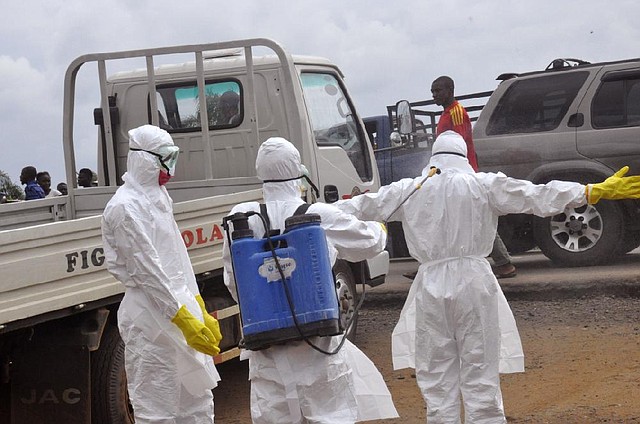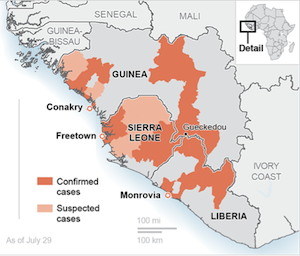U.S. agency adds $75 million for Ebola care
Health worker's spray each other with disinfectant chemicals as they worked with a suspected Ebola virus death in Monrovia, Liberia, Thursday, Sept. 4, 2014. As West Africa struggles to contain the biggest ever outbreak of Ebola, some experts say an unusual but simple treatment might help: the blood of survivors. The evidence is mixed for using infection-fighting antibodies from survivors' blood for Ebola, but without any licensed drugs or vaccines for the deadly disease, some say it's worth a shot. (AP Photo/Abbas Dulleh)
Friday, September 5, 2014
MONROVIA, Liberia -- The U.S. Agency for International Development announced Thursday that it would donate $75 million to fund 1,000 more beds in Ebola treatment centers in Liberia and buy 130,000 more protective suits for health care workers.
West Africa's struggling health systems have buckled under the pressure of an Ebola outbreak that has already killed about 1,900 people. Nurses in Liberia are wearing rags over their heads for protection from the dreaded disease. Concerns are that shortages of protective gear throughout the region are responsible for the high Ebola death toll among health workers.
The U.S. agency also urged American health care workers to respond to the outbreak. Rajiv Shah, the agency's administrator, said several hundred more international experts are needed and the agency will help send American health care workers to West Africa.
"This will get worse before it gets better," he said. "We have a coherent and clear strategy ... but it will take weeks to months to get operational at that scale."
The $75 million comes in addition to about $20 million the agency has already donated to fight the outbreak that was first identified in March in Guinea, and has spread to Liberia, Sierra Leone and Nigeria. The virus is spread through bodily fluids such as blood, sweat, urine or diarrhea.
Health workers account for about 10 percent of the deaths so far. Much of the protective gear they use must be destroyed after use, so Ebola wards need a constant flow of clean equipment.
One nurse at a hospital in Monrovia, Liberia's capital, said she and her colleagues had resorted to cutting up old uniforms and tying them over their faces, looking out through holes in the fabric. She spoke on condition of anonymity because she was not authorized to talk to the media.
"It is really pathetic," she said. "We are not equipped to face the situation."
With no goggles to protect them, their eyes burn from the fumes of chlorine used to disinfect the ward, the nurse said.
David and Nancy Writebol, American missionaries who worked at another hospital in Liberia, echoed those concerns, speaking from North Carolina, where they returned after Nancy Writebol survived an Ebola infection. They said doctors and nurses are overwhelmed by a surge of patients and there aren't enough hazard suits to keep them safe.
Health care workers can go through thousands of the suits a week, David Writebol said, and the suspension of flights to the region by many airlines is making it harder to get gear in.
Three American health care workers have been sickened with Ebola while working in Liberia. Nancy Writebol and Dr. Kent Brantly were flown back to the U.S. to be treated and have since recovered. The third, Dr. Rick Sacra, is being flown to Nebraska for treatment, according to a statement Thursday from aid group SIM USA.
Liberia has been hardest hit by the current outbreak, with the largest number of cases and deaths. Doctors Without Borders, which is running several Ebola treatment centers, said last week that its clinic in Monrovia is overrun with patients and doctors are no longer able to provide intravenous treatments.
The Liberian nurse, meanwhile, said she and her colleagues live every day with the fear that they'll become infected.
"When you go through this and return home, you lie in bed asking yourself: I am still safe? Or I have contracted the disease?" she said.
Meanwhile, health officials were monitoring more than 200 people who may have been exposed to Ebola in southern Nigeria.
Authorities had been cautiously optimistic that they would be able to keep Nigeria's outbreak relatively small since the Liberian-American who took the disease to Nigeria by plane was quickly isolated.
But last month a person he had come into contact with escaped surveillance and fled to the southern oil hub of Port Harcourt. That person infected a doctor, who, in turn, exposed dozens of people to the disease, the World Health Organization said.
Of the 200 people identified as exposed to the ill doctor, the WHO said about 60 are considered at high risk of getting Ebola.
Information for this article was contributed by Hilary Uguru of The Associated Press.
A Section on 09/05/2014

